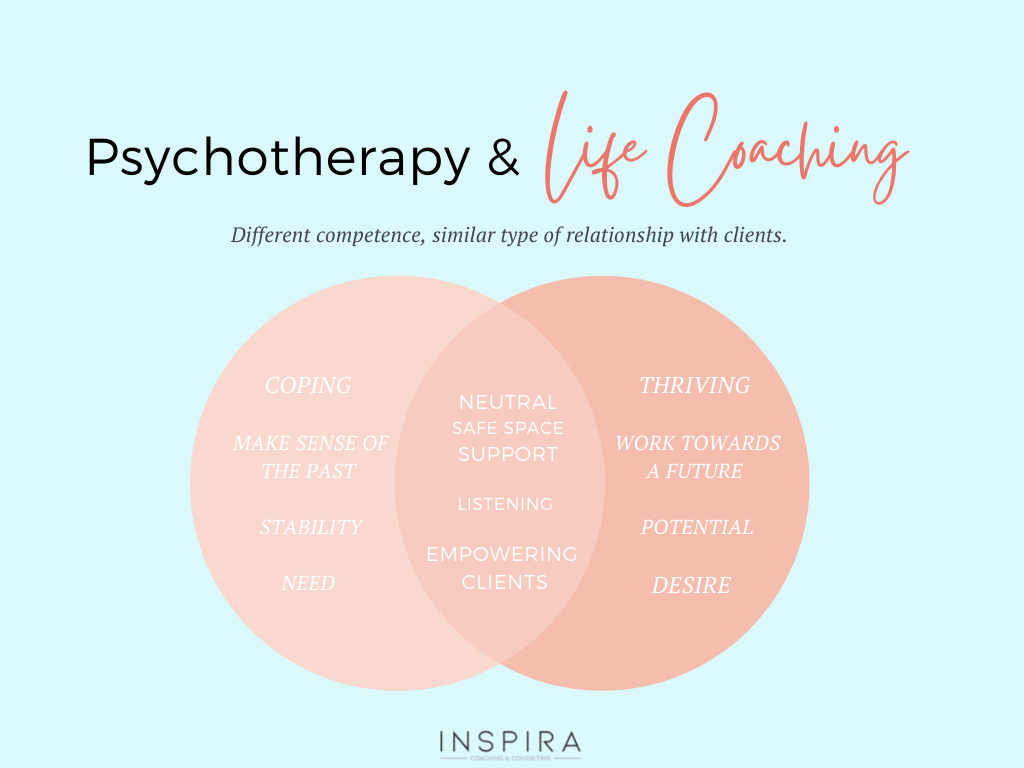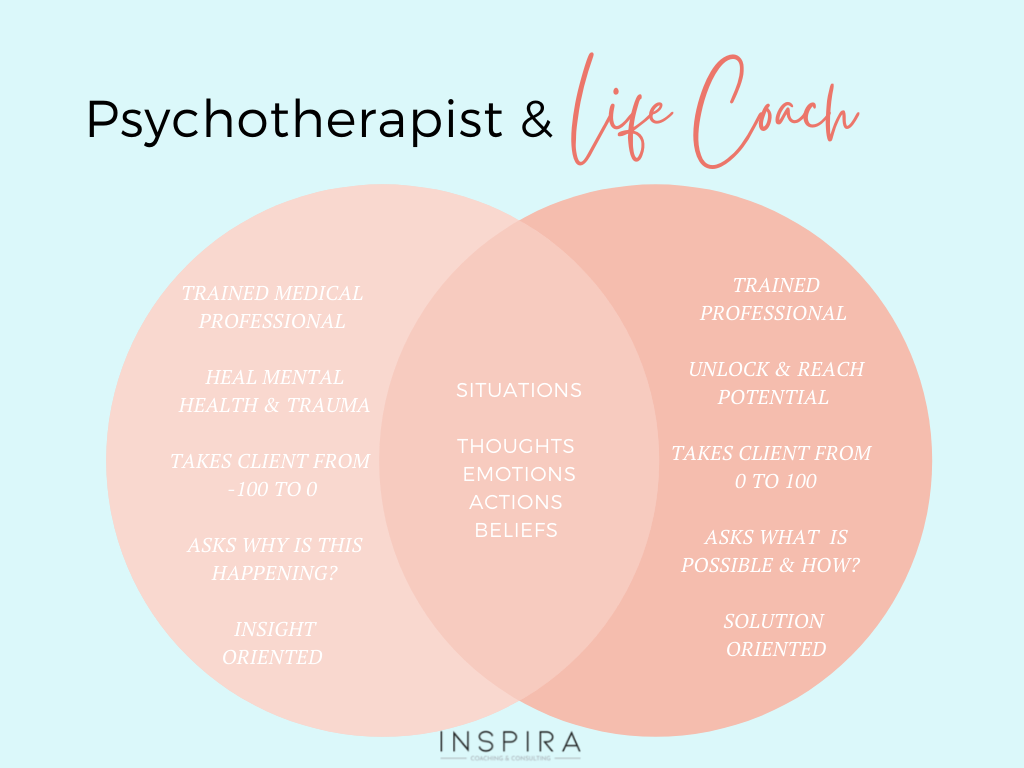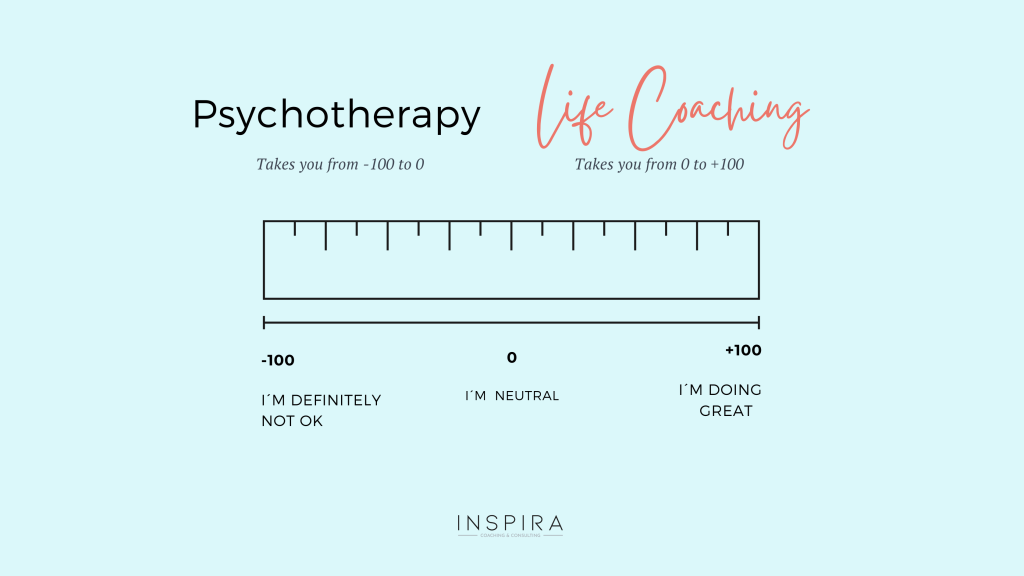
Life Coach vs. Psychotherapist
Before their first experience with coaching, people often wonder, what is the difference between coaching and psychotherapy.
From the outside, they may appear quite similar, right? Clients find a practitioner they like, schedule regular sessions and start working on what worries them. Both coach and psychotherapist will talk with a client in a safe, non – judgmental way and create a space, where the client feels accepted, heard and supported in solving problems.
Perhaps the core difference is, that psychotherapist is a medical professional, trained and licensed in diagnosing and treating people with mental illness. On the other hand, the coach is not a medical professional and is trained in working with clients who are mentally well but currently experiencing some blockage or obstacle in their life.

What can a coach do, that a psychotherapist can´t?
The added value of working with a coach is, that apart from being trained and certified in coaching, he/she usually has plenty of training and practical experience in other fields, often from top-level managerial or consultant positions. That means she/he can guide clients to effective and practical solutions even in difficult business situations or decisions.
This is my case as well, so when working with clients on work-related issues, I can quickly spot and understand business-specific needs and blend coaching with mentoring, consulting, training or other modalities, if appropriate.
A brief history of coaching
As a formal field, coaching is relatively young, but it has roots in many older disciplines. It draws on areas that include the human potential movement of the 60s, leadership training, adult education, personal development, and numerous areas of psychology. (1)
Life coaching was established as a profession during the 80s and grew in popularity in the 90s and 2000s. Today it is the second-fastest-growing industry in the world. (2)
So, who hires a life coach?
Originally, it was successful public figures who worked extensively with a life coach. From Oprah Winfrey through Bill Clinton all the way to CEOs like Steve Jobs (Apple) or Eric Schmidt (formerly Google). (3)
Today, many companies all over the world such as Goldman Sachs recognize coaching as one of the best development tools for their managers. Executive coaching is included as standard leadership training, for top executives and best performers in 25% to 40% of all Fortune 500. (4)

You obviously don’t have to be rich, famous or start a business to work with a coach 😊Anyone experiencing a troublesome issue or simply wanting more from their life (more motivation, joy, meaning, relationships, peace etc…), will benefit from the support of life coach.
The clients I currently work with are generally bright, ambitious professionals – specialists, managers and even students from a broad spectrum of industries and all walks of life. What connects them, is balancing increasingly more difficult work and home-related commitments & wanting to experience a better quality of life in one or both areas.
Life coaching vs. psychotherapy in more detail:
Psychotherapy
While psychology has many schools of thought (hence many types of psychotherapy exist) most major therapies tend to focus on an individual´s mental health conditions, alleviating emotional pain or working through trauma.
Generally speaking, therapy is a reflective process, that looks to the past to understand and come to terms with issues or events that took place.
Depending on the type of therapy, during the process therapist may offer advice and specific solutions and/or the client may gain insight into why he has adopted certain beliefs or behaviours with the hope of changing, improving or resolving issues.
Psychotherapists, can diagnose mental illness and carry out non-physical treatment (other than drugs or surgery etc…). That being said a client certainly doesn’t have to have a mental illness to seek and attend psychotherapy; he simply may need support in coping with a major life event.
Psychotherapy tends to be a more insight-oriented & long term process, with some conditions even lifetime support being adequate and necessary.

Life Coaching
Coaching takes a much more forward-focused approach. The coach works with clients to gain clarity in desires, define and achieve goals to create wanted change in their lives. The coach does not offer advice or “prescribe” solutions (in pure coaching). She/he guides the client to identify the appropriate type and size of goals.
With coaching, the client is encouraged to find subjectively appropriate answers and solutions within themselves and really implement them, by taking necessary action. The coach achieves this by asking the right thought-provoking questions, in the right way at the right time.
Life coaching may touch on the past, but it isn’t the main focus of the session, instead, the focus is on unlocking the client’s present moment potential and moving forward. While some coaches may have studied psychology, they do not offer psychotherapy or diagnose illnesses.
Coaching tends to be more solution-oriented and mid to short term in length. Usually lasting about 3,6 to 12 months (depending on complexity and frequency of sessions) until a specific issue is solved. Of course, the client may choose to collaborate with the same coach on several issues or as “ongoing” support.
Click here, for my simple description & suggestions for making the right choice between coach and psychotherapists. http://inspiraconsulting.sk/?page_id=1236

Relationship between psychotherapist and a coach:
Some psychotherapists will like to work on a client together with a coach at the same time or will recommend the client to a trusted coach, once the client is in a more stable place in life. This however depends on the type of therapy they provide and the status of the client.
Some psychotherapists also offer coaching services themselves and some psychotherapists will have their own coach for life or work-related themes.
Some coaches will have their own coach as a part of personal growth and some may even have their own psychotherapists, to work on past trauma or major life events.
And all this is all quite all right. Life can get tough and sometimes, we all benefit from the right type of help and support. The tools psychotherapists and coaches offer (even to one another) can and do work beautifully in tandem and complement one another 😊.
Why do even psychotherapists and coaches use the services of other Life Coaches?
You may wonder why, if a person is skilled in coaching or psychotherapy, they still benefit from the services of another coach.
To a certain extent we can „apply our tools to ourselves”, but none of us is enlightened and life sometimes gets difficult for all of us. As a matter of fact, I would advise you to be very cautious of anyone who claims they have “everything figured out” at all times.
In private, it´s only natural to get „sucked into“ situations emotionally and mentally because we are obviously, deeply invested in living our lives, not only observing them.
Another reason is that working with people in so-called “helping professions” is truly intensive work, where we have to remain objective and “detached” in order to be useful to clients. This means we need consistent “psycho-hygiene” to stay on top of our game. In addition to “self-help” tools, it helps to have the assistance of a trusted and objective professional, who can help us so to say „see the forest for the trees“ and gain perspective.
Are you curious about experiencing life coaching? Feel free to reach out. 😊
Sources:
- Lines D, Evans C. The Global Business of Coaching: A Meta-Analytical Perspective. Routledge; 2020
- https://coachingfederation.org/app/uploads/2020/09/FINAL_ICF_GCS2020_ExecutiveSummary.pdf)
- https://www.forbes.com/sites/remyblumenfeld/2020/01/14/9-great-reasons-to-hire-or-not-to-hire-a-life-coach/
- https://www.linkedin.com/pulse/famous-executives-who-had-coaches-victor-prince/
- https://visionfirecoaching.com/famous-entrepreneurs-who-had-business-coaches-and-how-it-helped-them/
- https://www.exe-coach.com/the-business-case-for-coaching.htm/


Add A Comment